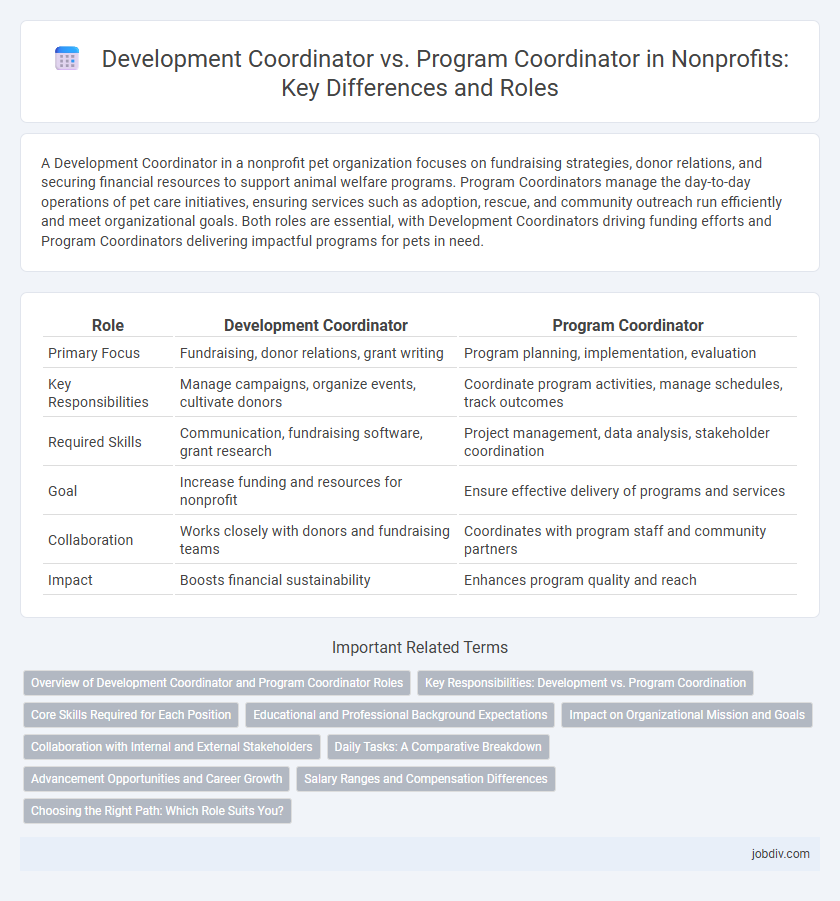A Development Coordinator in a nonprofit pet organization focuses on fundraising strategies, donor relations, and securing financial resources to support animal welfare programs. Program Coordinators manage the day-to-day operations of pet care initiatives, ensuring services such as adoption, rescue, and community outreach run efficiently and meet organizational goals. Both roles are essential, with Development Coordinators driving funding efforts and Program Coordinators delivering impactful programs for pets in need.
Table of Comparison
| Role | Development Coordinator | Program Coordinator |
|---|---|---|
| Primary Focus | Fundraising, donor relations, grant writing | Program planning, implementation, evaluation |
| Key Responsibilities | Manage campaigns, organize events, cultivate donors | Coordinate program activities, manage schedules, track outcomes |
| Required Skills | Communication, fundraising software, grant research | Project management, data analysis, stakeholder coordination |
| Goal | Increase funding and resources for nonprofit | Ensure effective delivery of programs and services |
| Collaboration | Works closely with donors and fundraising teams | Coordinates with program staff and community partners |
| Impact | Boosts financial sustainability | Enhances program quality and reach |
Overview of Development Coordinator and Program Coordinator Roles
Development Coordinators manage fundraising efforts, donor relations, and grant writing to secure financial support for nonprofit organizations. Program Coordinators oversee the planning, implementation, and evaluation of specific programs, ensuring they meet organizational goals and community needs. Both roles require strong communication and organizational skills, but Development Coordinators focus on resource development while Program Coordinators concentrate on program execution.
Key Responsibilities: Development vs. Program Coordination
Development Coordinators focus on securing funding through grant writing, donor relations, and fundraising campaigns to ensure financial sustainability for nonprofits. Program Coordinators manage the planning, implementation, and evaluation of specific projects or services, emphasizing program delivery and outcome tracking. While Development Coordinators drive resource acquisition, Program Coordinators concentrate on operational execution and participant engagement.
Core Skills Required for Each Position
A Development Coordinator requires expertise in fundraising strategies, donor relationship management, and grant writing to effectively secure resources and support for nonprofit initiatives. In contrast, a Program Coordinator must excel in project management, community outreach, and monitoring and evaluation to ensure programs are successfully planned, implemented, and assessed. Both roles demand strong communication, organizational, and teamwork skills but apply them to distinct operational focuses within nonprofit organizations.
Educational and Professional Background Expectations
Development Coordinators typically require a background in fundraising, marketing, or communications, often holding degrees in nonprofit management, business, or public relations. Program Coordinators usually possess educational credentials in social sciences, education, or program management, emphasizing experience in project planning and community engagement. Both roles prioritize strong organizational skills and relevant internships or volunteer experience in nonprofit settings.
Impact on Organizational Mission and Goals
Development Coordinators focus on securing funding and building donor relationships to support financial sustainability, directly impacting a nonprofit's ability to achieve its mission. Program Coordinators manage and implement specific projects to ensure program goals align with organizational objectives, driving mission fulfillment through effective service delivery. Both roles are essential, with Development Coordinators enhancing resource availability and Program Coordinators ensuring impactful program execution.
Collaboration with Internal and External Stakeholders
Development Coordinators primarily engage with external stakeholders such as donors, sponsors, and community partners to secure funding and support, while Program Coordinators focus on collaboration with internal teams and beneficiaries to implement and monitor initiatives effectively. Both roles require strong communication and relationship-building skills to align organizational goals and maximize impact. Effective collaboration between Development and Program Coordinators ensures cohesive strategy execution and resources optimization within nonprofit operations.
Daily Tasks: A Comparative Breakdown
Development Coordinators focus on fundraising efforts, donor relations, and grant writing to secure financial support for the nonprofit, managing communication with stakeholders and organizing fundraising events. Program Coordinators oversee the implementation of specific projects, coordinate with staff and volunteers, handle scheduling, and ensure program goals and outcomes align with the nonprofit's mission. Both roles require strong organizational skills, but Development Coordinators emphasize resource acquisition while Program Coordinators concentrate on program execution and participant engagement.
Advancement Opportunities and Career Growth
Development Coordinators in nonprofits primarily focus on fundraising strategies and donor relations, offering advancement into senior development roles such as Development Manager or Director of Development. Program Coordinators manage specific initiatives and teams, with career growth often leading to Program Manager or Director positions that emphasize operational leadership. Both paths provide valuable experience, but development roles tend to offer faster upward mobility through revenue-generating skills, while program roles deepen expertise in program design and management.
Salary Ranges and Compensation Differences
Development Coordinators in nonprofits typically earn between $45,000 and $65,000 annually, focusing on fundraising, donor relations, and grant writing to support organizational growth. Program Coordinators usually receive salaries ranging from $40,000 to $60,000, managing program implementation, staff coordination, and client services. Compensation differences reflect the varying demands and expertise required, with Development Coordinators often receiving bonuses tied to fundraising success.
Choosing the Right Path: Which Role Suits You?
Development Coordinators focus on fundraising strategies, donor relations, and grant writing to secure financial support for nonprofit organizations, while Program Coordinators manage the planning, implementation, and evaluation of specific projects or services delivered to the community. Selecting between these roles depends on whether you are more interested in external relationship-building and resource development or internal program management and direct service coordination. Understanding each position's core responsibilities and required skills helps align your career path with your passion and strengths in the nonprofit sector.
Development Coordinator vs Program Coordinator Infographic

 jobdiv.com
jobdiv.com